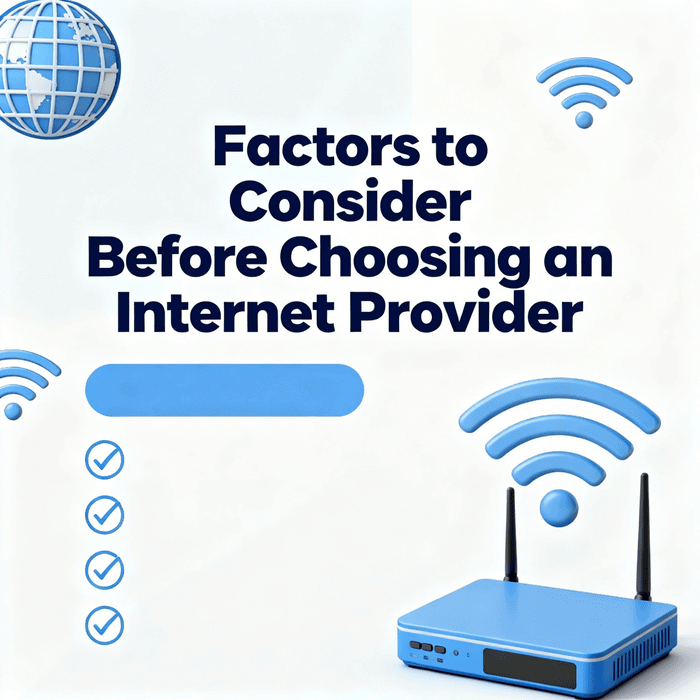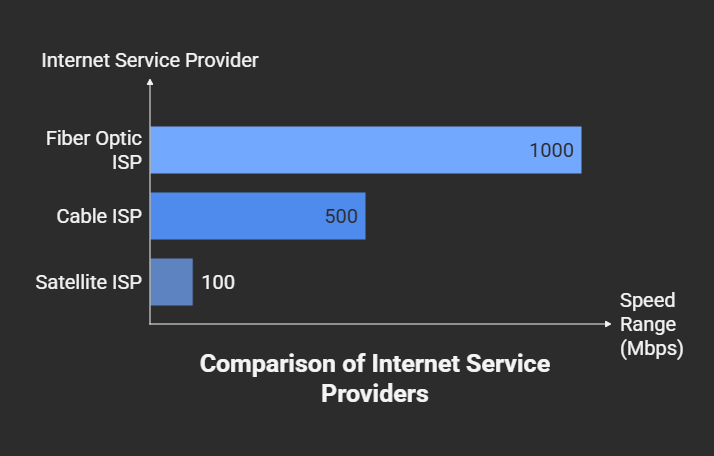Choosing the best internet provider in 2025 can feel overwhelming with so many options and aggressive marketing. The right choice depends not just on price or speed, but on how well the service fits your household’s unique needs. This comprehensive, SEO-optimized guide simplifies the process, highlights what truly matters, and provides actionable steps to help you make an informed, future-ready decision.
When it comes to choosing an internet provider, most people will go with the biggest brand available in their area.
Why?
Well, people think that if it is working for others, it must be good.
While this notion might be true in some cases, it is not ideal. So, what is the best way to pick an internet provider? Are there factors affecting this selection? Can you actually pick a good provider without research? Do you understand your online needs?
If your head is also buzzing with all these questions, then you are at the right place. This write-up will help you look at some of the best and most basic factors that every buyer must consider before picking an internet service provider.

Table of Contents
Availability
Let us start with arguably the most important factor – Availability.
Although there are so many different Internet Service Providers (ISPs) serving the USA, not a single ISP is available in all 50 states. This means that when you have to pick an ISP, your location will play a very important role.
So, before you start shortlisting your options, it is important to consult the availability map of each brand or use a ZIP code searcher to ensure that the ISP is available in your area.
Customer Support
While shortlisting the best internet service providers, people often disregard the importance of customer support. Instead, they prefer features like affordable prices or fast speeds. However, keep in mind that customer support plays a very important role in ensuring that the ISP you have picked is truly reliable.
How?
Well, when a company values its customers, it is evident from its customer support. They ensure minimum response time, inclusivity, and offer support in multiple languages. All these things help build credibility and the trust factor.
Responsive, accessible customer support ensures your issues are quickly resolved. Look for:
- 24/7 support (phone, chat, and email)
- Fast average response times
- Multi-lingual assistance
- Local service locations
Read recent online reviews and consumer reports. Great support builds trust and demonstrates a provider’s reliability.
Speed
Blazing fast speed, lightning-fast internet, high speed, or lag-freeare a few of the terms used by brands to describe their internet plans. These show that customers truly value speed while using the internet.
However, keep in mind that speed requirements vary based on the online behavior of the user.
For instance, 10-25 Mbps is enough speed to support basic online activities like browsing or streaming. However, if you want an internet for HD streaming and online gaming, then you need an internet speed of 25-40 Mbps or even more.
Speed needs vary. For most households, download speeds of 50–100 Mbps are sufficient, while gamers and families with heavy streaming or remote work should look for 200 Mbps or above. Upload speeds, critical for video calls, cloud backup, and content creation, are best with fiber connections, which offer symmetrical speeds.
Speed benchmarks:
| Activity | Minimum | Recommended |
| Browsing/email | 5 Mbps | 10 Mbps |
| HD streaming | 10 Mbps | 25 Mbps |
| 4K streaming | 25 Mbps | 50 Mbps |
| Video calls | 3 Mbps | 8 Mbps |
| Multi-user (4+) | 50 Mbps | 100+ Mbps |
Plans and Bundles
Nearly every ISP offers multiple internet bundles. These bundles help themcater to the audience based on budget, online activity, and speed requirements.
However, keep in mind that some ISPs might have a huge variety of internet plans with discounted prices, but they might not be the best.
So, it is important to understand your requirements first. Also, look for a company that offers a bundling option. For instance, there are ISPs that offer cable TV and phone service as well. This way, you will be able to save more while getting maximum value with your internet plan.
Price Tag
Price plays a very important role in making a purchase. In fact, if you ask a customer to pick an internet plan, they will instantly look for the cheapest option.
However, keep in mind that a cheaper plan does not mean it is a good option. Instead, most of the cheap plans only fulfill the bare minimum requirements. To make sure you are getting the best plan, emphasize the value.
So, how do you calculate the value?
Well, to understand the value, you need to have a side-by-side comparison of the price and the features. This way, you can understand if an ISP is offering you the maximum value atthe minimum price.
Contract
While picking an ISP, most customers do not understand the importance of a contract. A contract is a loophole that is used by a lot of brands to bind customers for at least 1-2 years. This means that once the customer has picked a plan and made a purchase, there is no way to leave for the next few years.
Moreover, if the customers want to switch to any other brand or option, they need to pay a contract breach penalty. So, while picking an internet brand, make sure to check the fine print and look for the contract deal.
With careful consideration, you will be able to find an internet brand that promises no contracts.
Data Caps
Data capsare another very important thing to consider while picking an ISP. While most ISPs will claim to offer unlimited internet, they might come with a hidden data cap.
This means that most residential internet providers claim that there is no data cap. However, they might put a data cap at nearly 1TB. Since the limit is too big to be exhausted by a single user, most customers never get to reach the limit.
However, if you have a big family or you are trying to run a small business on your residential internet plan, then you need to consider the data capacity very carefully.
These are just a few factors, and you might have some other requirements besides these ones. So, make sure you consider everything before opting for a new internet connection.
Network Reliability and Uptime
Consistent connectivity is non-negotiable. Look for providers with high uptime (over 99%), up-to-date infrastructure, and favorable customer reviews regarding outage frequency.
Equipment and Installation
Ask about:
- Self-installation kits (save money, but require tech savvy)
- Included or optional modems/routers—consider buying your own for long-term savings
- Wi-Fi 6 or mesh system support for modern connectivity needs
Promotional Offers and True Costs
Beware of attractive first-year pricing followed by steep hikes in the second year. Ask for written confirmation of regular, post-promotional pricing.
Reputation and Independent Reviews
Trust real, recent customer reviews, and consult annual ISP rankings from Consumer Reports and the Better Business Bureau. Ask locals about outage patterns and customer service experiences to get the real story.
Comparison Table: Top U.S. Internet Providers (2025)
| Provider | Best For | Speed Range | Starting Price | Contract | Availability (States) |
| Google Fiber | Overall Quality | 1–5 Gbps | $70/month | Optional | 19+ |
| AT&T Fiber | Fiber Coverage | 300–5000 Mbps | $55/month | 1 year | 21 |
| Verizon Fios | Northeast, Fiber | 200–1000 Mbps | $40/month | 1–2 years | 9 |
| Xfinity | Cable, Coverage | 75–1200 Mbps | $30/month | 1 year | 40 |
| T-Mobile 5G | No Contract | 33–182 Mbps | $50/month | None | Nationwide |
Types of Internet Connections
Choosing the right internet provider often means first understanding which type of connection fits your needs. Here are the main options:
Fiber-optic:
Offers the fastest speeds (up to 1 Gbps or more), exceptional reliability, and is ideal for heavy users, smart homes, or households with many connected devices.
Cable:
Fast and widely available, but speeds can fluctuate during peak times due to shared bandwidth in your area.
DSL:
Uses phone lines; speeds are lower than fiber or cable but may suffice for lighter use and rural areas.
Satellite:
Available almost everywhere but has higher latency and potential weather issues; best for remote locations.
Wireless (4G/5G Home Internet):
Uses cellular networks for home connectivity. Convenient for mobility and easy setup, but speeds and data limits can vary.
Which Connection is Best for You?
-
For high-speed needs and reliability: Fiber-optic (if available)
-
For widespread coverage: Cable
-
For rural areas: DSL or Satellite
-
For cutting-edge mobility: Wireless home internet
Frequently Asked Questions (FAQ)
How do I know which internet provider covers my area?
Use availability maps on provider websites or third-party postcode checkers to see ISPs serving your ZIP code.
What is a good speed for a family of four?
For basic use, 50–100 Mbps suffices. For HD streaming, gaming, and work-from-home, 200 Mbps or higher is recommended.
What types of hidden fees should I look out for?
Installation, activation, equipment rental, early termination, and overage fees are common.
How can I ensure I get the promised speed?
Read real customer reviews, ask for a written SLA, and check for a satisfaction guarantee or trial period.
Is it worth bundling internet with TV and phone?
Bundling can save money and simplify billing—but evaluate if you’ll truly use all services before committing.
Comparison ISP Connection Table:
| Provider | Speed Range | Price / Month | Contract Required | Key Extras |
|---|---|---|---|---|
| Fiber Optic ISP | 200–1000 Mbps | $60–$100 | Optional | Included Wi-Fi, 24/7 support, No cap |
| Cable ISP | 100–500 Mbps | $50–$85 | Yes (1 yr) | TV bundle option |
| Satellite ISP | 25–100 Mbps | $70–$150 | Yes (2 yrs) | Rural coverage |

Conclusion Section: Making Your Internet Provider Decision
Choosing the right internet service provider is one of the most important decisions you’ll make for your household or business connectivity needs. With the rapid evolution of technology and increasing dependence on reliable internet access, taking the time to thoroughly research and evaluate your options will pay dividends in the long run.
Key Takeaways on Internet Provider in 2025
Remember that the “best” internet provider isn’t necessarily the one with the fastest speeds or the lowest price—it’s the one that best matches your specific needs and circumstances. Start by honestly assessing your usage patterns, budget constraints, and non-negotiable requirements. Whether you’re a casual browser who primarily checks email and social media, or a power user running a home-based business with multiple devices, understanding your needs is the foundation of making an informed choice.
Don’t let marketing promises overshadow practical considerations. While blazing-fast gigabit speeds might sound appealing, they’re unnecessary if you’re primarily streaming Netflix and browsing the web. Similarly, the cheapest plan might seem attractive initially, but hidden fees, poor customer service, and unreliable connections can quickly make it more expensive than higher-priced alternatives.
Your Action Plan: Next Steps
Before committing to any internet service provider, take these essential steps:
Research thoroughly: Use availability checkers, read recent customer reviews, and compare actual speeds reported by users in your area rather than relying solely on advertised speeds. Check with neighbors and local businesses about their experiences with different providers.
Ask the right questions: When contacting potential ISPs, inquire about service level agreements, uptime guarantees, data caps, contract terms, and what happens if you need to cancel or downgrade your service. Get all promises in writing.
Test before you commit: If possible, look for providers offering trial periods or satisfaction guarantees. This allows you to test real-world performance in your specific location and usage scenarios.
Plan for the future: Consider not just your current needs, but where your internet usage might be in 2-3 years. Will you be working from home more? Adding smart home devices? Supporting additional family members? Choosing a provider with room to grow can save you the hassle of switching later.
Take Control of Your Internet Experience
The internet has become as essential as electricity or water in our daily lives. Don’t leave this critical decision to chance or settle for whatever provider happens to knock on your door first. By applying the factors discussed in this guide—availability, connection types, speed requirements, reliability, customer support, pricing transparency, contract flexibility, and security features—you’ll be equipped to make a choice that serves you well for years to come.
Ready to find your ideal internet provider? Start by creating a shortlist of available ISPs in your area, then use the comparison framework and questions outlined in this guide to evaluate each option systematically. Your future self will thank you for taking the time to choose wisely rather than rushing into a decision you might regret.
What factors matter most to you when choosing an internet provider? Have you had experiences—positive or negative—that would help others make better decisions? Consider sharing your insights to help fellow consumers navigate this important choice more confidently.







